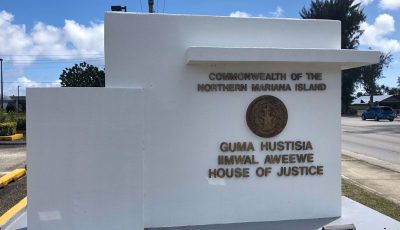JGO files appellate brief in support of Superior Court’s decision to dismiss Torres’ suit
The House of Representatives’ Judiciary and Governmental Operations Committee has filed an appellate brief in support of the Superior Court’s previous decision to dismiss the lawsuit of Gov. Ralph DLG Torres against the JGO.
Because Torres has recently begun the process of appealing the Superior Court’s decision to dismiss his case against the JGO committee with the Supreme Court, the House JGO Committee filed its appellate brief last Aug.18, in support of the Superior court’s decision.
According to JGO chair Rep. Celina Babauta (D-Saipan), the JGO believes that the Superior Court reasonably granted their motion to dismiss the governor’s case.
“After the JGO issued its subpoena, the governor decided that he would disregard the CNMI Constitution and ignore his legal obligation to appear. He sued the JGO rather than answer questions under oath. We filed a motion to dismiss based on legislative immunity and the Superior Court reasonably granted our motion,” she said.
Babauta explained that they believe the court’s decision was reasonable because the committee has absolute immunity from being sued.
“The committee had absolute immunity from being sued when it was engaged in a legitimate legislative activity. The JGO argued that the Committee itself possesses the very same immunity that individual members possess because the JGO investigation was a legitimate legislative activity that would be immune from suit. The Superior Court agreed with the JGO Committee and reasonably granted our motion,” Babauta said.
“The Executive Branch cannot continue to flout the rule of law. The committee looks forward to oral arguments on October 27, 2022, and to putting this matter to rest, once and for all,” Babauta continued.
Meanwhile Rep. Donald Manglona (Ind-Rota) argues that the subpoena the House issued, which was ultimately what triggered Torres to launch his lawsuit in the first place, was lawful.
“At the heart of the matter, the JGO issued a lawful subpoena based on the CNMI Constitution and CNMI statutes. The law of every other state and federal jurisdiction all supports the JGO’s position that the committee had every right to issue a legislative subpoena for the governor to answer questions related to his misuse of public funds,” he said.
Essentially, the JGO brief pointed out the inconsistencies and internal contradictions of the governor’s legal arguments on legislative immunity.
The JGO brief also demonstrated that, contrary to the governor’s position, the relevant case law holds that the Executive Branch is not allowed to sue the members of a legislative committee.
The brief stated that Torres, through his four on-island and off-island attorneys, asserts in one section of his brief that the Supreme Court may not consider federal or state cases as persuasive authority in interpreting the CNMI Constitution.
However, the governor allegedly makes this argument for the first time on appeal. In the trial court, he instead urged the court to follow federal and state cases on legislative immunity.
“Arguments raised for the first time on appeal are generally waived or disregarded, the committee argues,” the brief said.
Lastly, the JGO brief addressed the governor’s arguments that the Superior Court improperly considered the House Minority Report from the 21st Legislature because his underlying Complaint did not refer to this document.
“The governor’s brief falsely asserted that the JGO investigation was not referred to the committee from the House,” the document stated.
Ultimately, the JGO stands firm in their belief that Judge Pro Tem Timothy H. Bellas made a careful and nuanced ruling on the committee’s legislative immunity which was consistent with the Supreme Court’s precedents.
“His ruling on judicial notice of the Minority Report was similarly insightful and consistent with controlling law. There are three co-equal branches of the Commonwealth government, each has a critical role to play. The governor has the audacity to ask the one branch of the CNMI government, the Judiciary, to allow him to ignore the CNMI laws that provide for our Legislature to perform its constitutional duty to check and balance the Executive Branch,” said the brief.



























